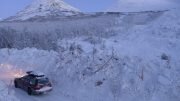Better quality of fireworks is one of the reasons why the number of injuries on New Year’s Eve has gone down. But for many pets, partying is a nightmare.
The old stick-rockets – which are now banned – led to many injuries and fires, numbers that went down noticeably after such rockets were banned in 2008.
Both the Norwegian Fire Protection Association and the Directorate for Civil Protection (DSB) report that in recent years the industry has given a more serious impression and that there is better quality of the fireworks sold today than before.
“The industry is well regulated and we see that injuries and fires in connection with fireworks went down after the ban on stick-rockets was enforced. The injuries we see now occur in connection with irresponsible use and not as a result of poor fireworks,” says Ivar Bjerke of the Norwegian Fire Protection Association in a press release.
Good advice
His advice for avoiding fireworks damage is to keep the fireworks dry and safe, plan the shot well in advance, preferably while it’s not yet lit, wear goggles and, not least, read the operating instructions and keep a good distance.
When lighting a fire, use a match or wind-protected lighter, and never bend over the fireworks. The launching site must not be near a house or other combustible such as wires or branches from trees. The fireworks must be placed on a hard surface and often supported so that it does not tip over.
Fire months
December and January are the two months of the year with the most fires in Norway. In December last year, the fire service reached 1,041 missions relating to fire and in January this year they had 1,211 missions. Most of these relate to fire in buildings and in chimneys. Fires in the stove are also high on the list, according to statistics from the Norwegian Fire Protection Association. Consuming a lot of alcohol combined with cooking is not a good idea.
Several places in Norway have also introduced a total ban on the shooting of fireworks. In Bergen, for example, there is a total ban on the use of fireworks in and near the areas dense with wooden buildings. Also in Stavanger, Trondheim and Oslo, there are total bans in some areas.
Animals’ nightmares
Many animals have a terrible time during what is perhaps the biggest party night of the year for us humans. Bright lights and loud bangs are not good for dogs, cats, birds and other animals.
Many animals, and as many as half of all dogs, have some kind of sound sensitivity or phobia against loud noises. Dog owners are therefore encouraged to train the dog to get used to the sound by playing recordings of fireworks or other sounds, but this is something that needs to be trained over time.
On New Year’s Eve there are several measures you can take, the most important thing is not to leave your pet alone. For dogs, one should find a room that is as soundproof as possible, such as a bathroom or basement. For dogs it is also a good idea to arrange an extra-long walk early in the day so that it is a little tired.
Use drone-sense
Using a drone to capture the ultimate New Year’s image can be very tempting, but it is both illegal and can lead to fatal accidents.
The regulations say that flying hobby drones in the dark because of poor visibility is prohibited. For privacy and security reasons, it is also not allowed to fly drones over public gatherings, and the drone must stay 150 meters from people, cars and buildings.
Should a drone be hit by fireworks, hit the ground and hit people there it can also have serious consequences.
Cheap can be expensive
Saving money on crossing the border to buy fireworks can quickly prove to be a bad idea, leading to both fines and seizures. In order to import fireworks, even for private use, you must have applied for and obtained an import permit from the Directorate for Civil Protection (DSB) in advance.
The Customs Office reminds you that you have to go to the red zone if you have fireworks in your luggage, even if you have permission in advance. If you go to a green zone and are controlled, the fireworks will be seized regardless of whether you have a permit or not.
© NTB Scanpix / #Norway Today





Be the first to comment on "The number of fireworks injuries is declining – still important with precautions"